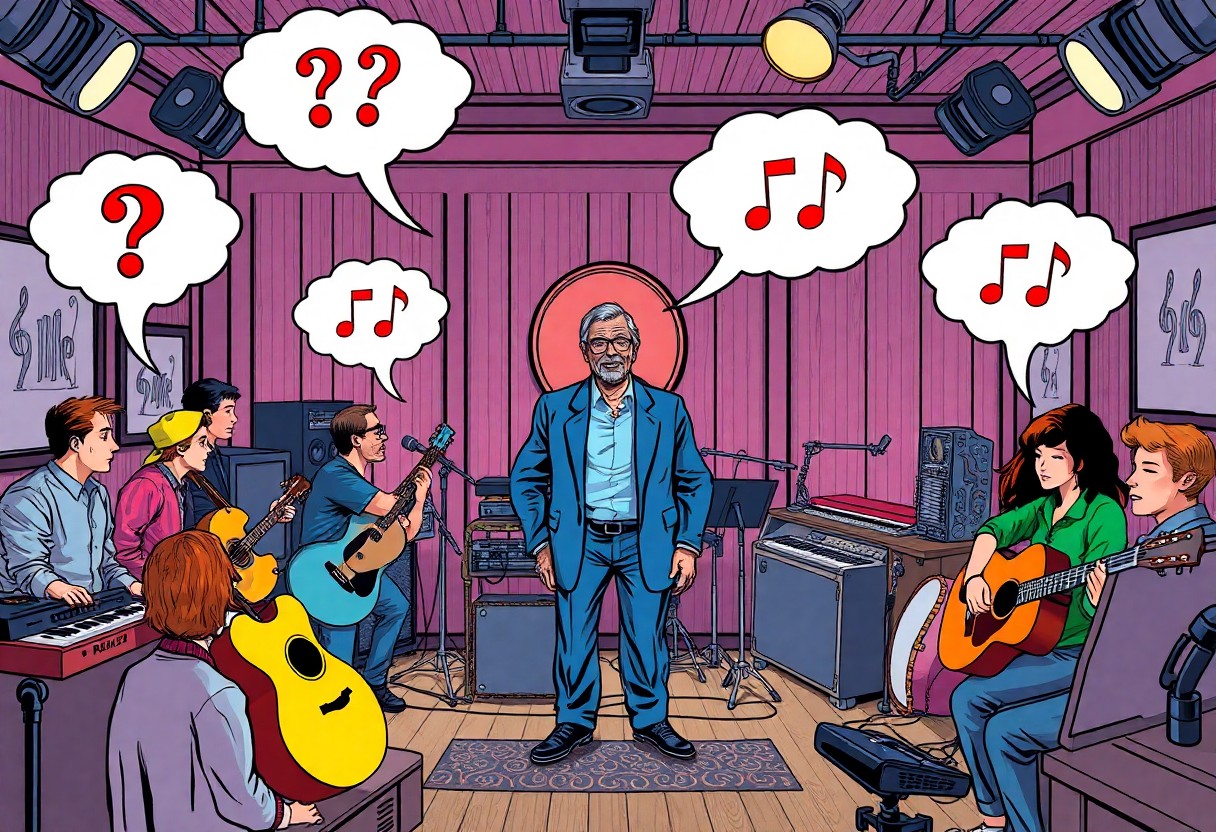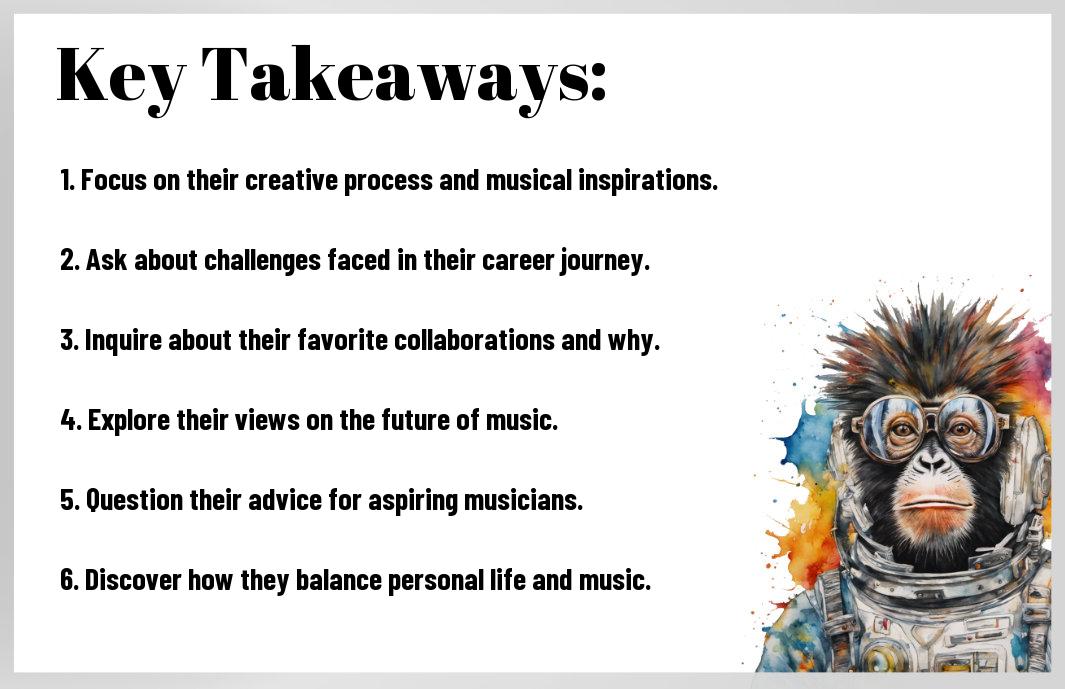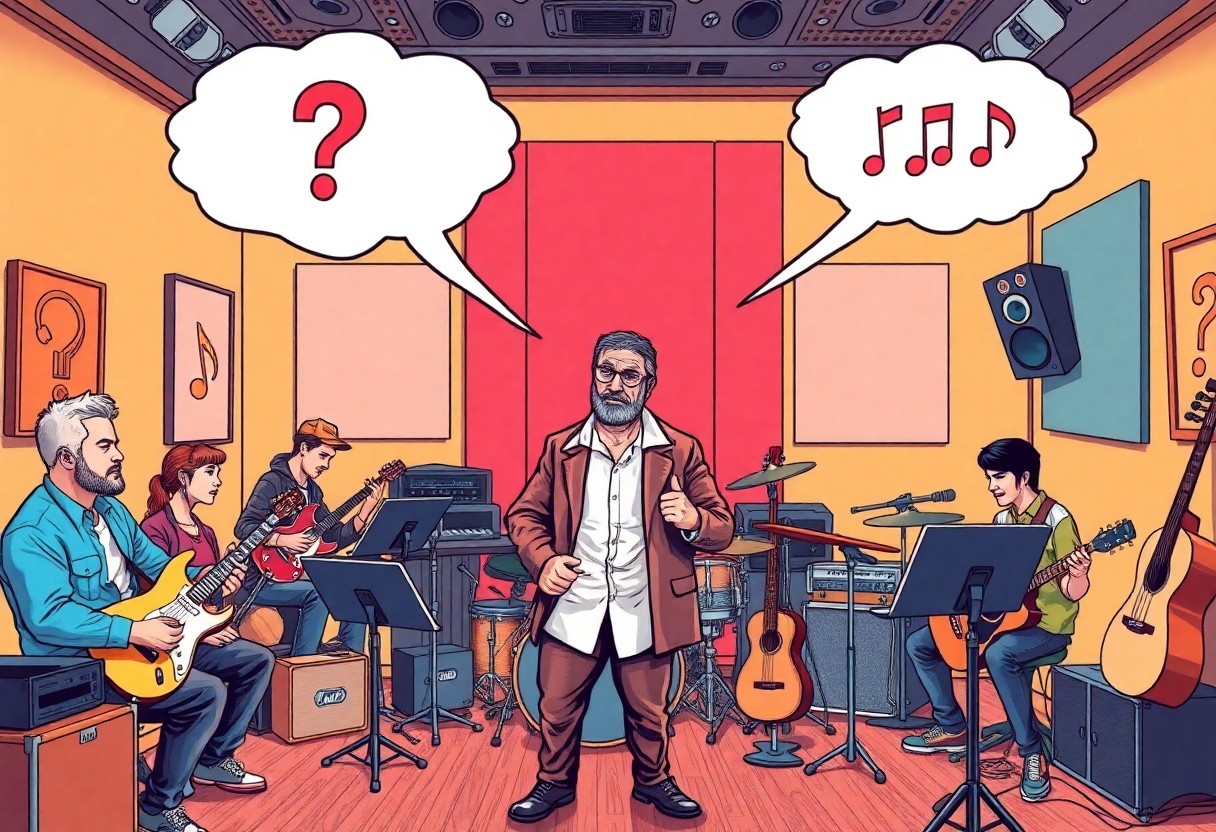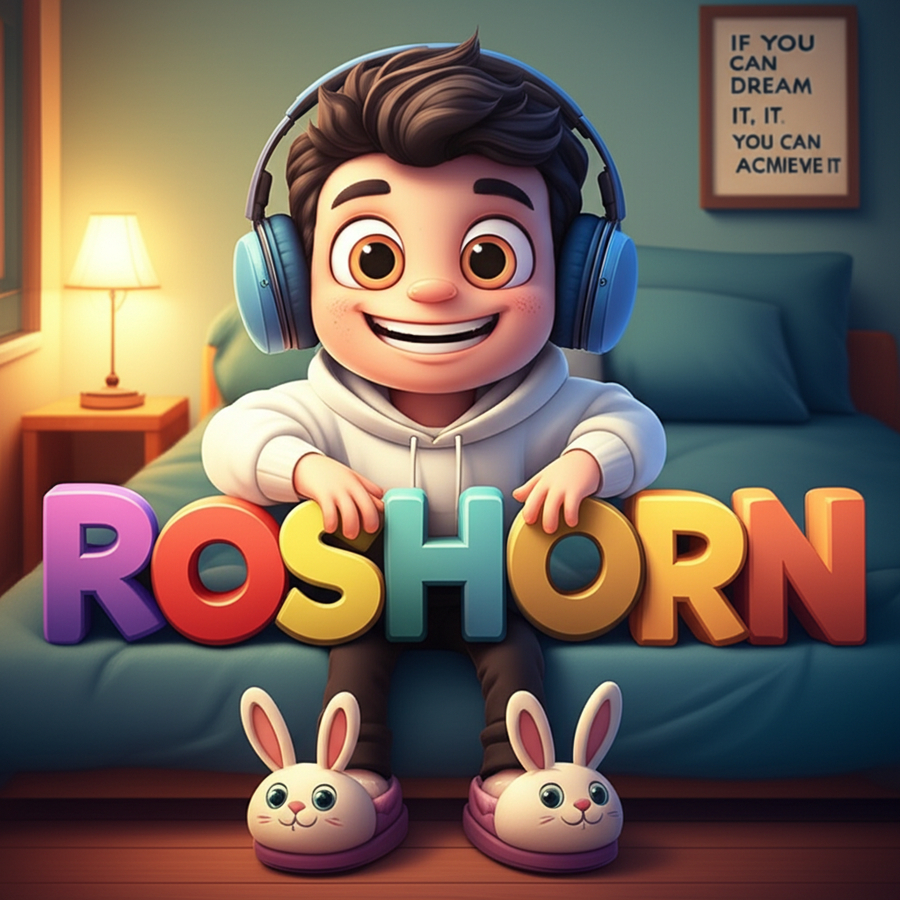There’s immense value in preparing thoughtful questions when you have the chance to engage with a leading music artist. Your inquiries can uncover insights into their creative process, industry experiences, and personal journey. By crafting precise and meaningful questions, you present yourself as a keen listener and gain deeper understanding of the music world. This guide will help you brainstorm 20 compelling questions to make your interaction both informative and impactful, ensuring you get the most out of your conversation with a prominent figure in music.
Key Takeaways:
- Prepare questions that explore the figure’s creative process, such as their songwriting approach and sources of inspiration.
- Include inquiries about their career journey, challenges faced, and memorable moments to gain insights into their professional growth.
- Ask about their views on the music industry’s future, technological impact, and advice for aspiring musicians to provide broader context and guidance.

Unlocking the Artistic Mind: Questions That Inspire Creativity
Engaging with prominent musicians through thought-provoking questions can reveal the intricate processes behind their creativity. These inquiries invite artists to share how they translate emotions, experiences, and influences into compelling music. You gain insights not only into their artistic journeys but also into the techniques that spark innovation. By probing these areas, you unlock perspectives that encourage your own creative exploration and deepen your appreciation of the artistry involved.
What experiences or influences shaped your music style?
You’ll find that many musicians draw from a mosaic of life experiences, cultural backgrounds, and diverse musical genres to craft their unique sound. Their formative years, exposure to different musical traditions, and personal milestones often surface as pivotal influences. Understanding these factors can help you trace the evolution of their style and see how external and internal forces intertwine to define an artist’s signature voice.
How do you overcome creative blocks in your songwriting process?
Musicians frequently encounter creative blocks and employ varied strategies to move past them. Some turn to collaboration, finding inspiration through fresh perspectives, while others change environments or revisit old material to ignite ideas. Techniques like free writing, improvisation, or even stepping away to recharge mentally are common methods to restore creative flow and maintain productivity during challenging periods.
Diving deeper, overcoming creative blocks often involves a combination of mental shifts and practical exercises. For example, The Beatles reportedly used “stream-of-consciousness” jamming sessions to break writer’s block, enabling spontaneous ideas to surface without overthinking. Encouraging your brain to explore without self-criticism and scheduling dedicated times for creativity, regardless of immediate results, also help maintain momentum. You might find that setting micro-goals or limiting yourself to certain constraints, such as writing with only two chords, stimulates innovation by forcing you to work within boundaries rather than aimlessly searching for perfection.


The Industry Landscape: Insights on Music Business Practices
By understanding the inner workings of the music industry, you can better navigate its complexities and leverage opportunities. The shift toward streaming platforms, the rise of artist-owned labels, and new monetization strategies have all transformed how music is created, distributed, and consumed. Gaining insights into these dynamics equips you to make informed decisions that enhance both your creative output and financial outcomes.
What are the most significant changes you’ve observed in the music industry?
The transition from physical sales to digital streaming has redefined revenue models, with platforms like Spotify and Apple Music dominating distribution. You also see social media’s influence skyrocketing, enabling viral hits without traditional marketing. Independent artists now have more tools—like Bandcamp and direct fan engagement—to bypass gatekeepers. However, this democratization comes with challenges, such as lower per-stream payouts and increased content saturation.
How do you navigate the balance between artistic integrity and commercial success?
Maintaining your artistic voice while appealing to a broad audience often means making strategic compromises without sacrificing core values. Collaborations with producers or songwriters can refine your sound and boost commercial appeal without diluting your message. Tailoring certain tracks for radio or playlists alongside more experimental works keeps both sides satisfied. Transparency with your fanbase about your creative decisions also fosters trust and loyalty.
Finding harmony between artistry and commercial viability involves prioritizing projects that align with your authentic expression yet have structural hooks—such as catchy choruses or relatable themes—that resonate widely. You might release experimental tracks to maintain your creative edge, then drop more accessible singles that drive streaming numbers. Navigating label expectations or market trends becomes a negotiation, where you advocate for your vision while adapting to audience preferences and industry standards. This balancing act strengthens your brand and sustains long-term career growth.
Fan Connection: Understanding Audience Engagement
Building a genuine rapport with your fans transforms listeners into advocates who spread your music and message. You gain valuable insight by observing which tracks ignite enthusiasm or inspire covers and remixes. This engagement loop sharpens your creative direction and marketing strategies, resulting in work that resonates deeper. Fans also provide real-time feedback via comments, shares, and concert reactions, allowing you to tailor experiences that feel inclusive and rewarding. Your ability to foster these connections directly influences the sustainability and growth of your career.
What role do fans play in your creative process?
Fans often act as a sounding board, sparking ideas that might not have emerged otherwise. Their responses to live performances and online releases teach you what emotions and themes strike a chord, encouraging experimentation and evolution. By paying attention to listener stories and interpretations, you can infuse your compositions with greater relatability and depth, creating a more intimate artistic dialogue.
How do you use social media to connect with your audience?
Social media platforms serve as a direct highway to your fanbase, allowing you to share behind-the-scenes content, announce new projects, and engage in conversations instantly. You can amplify your presence by posting exclusive clips, running interactive polls, or hosting live Q&A sessions, which humanize your persona and foster loyalty.
Diving deeper, your strategic use of analytics tools available on platforms like Instagram, TikTok, and Twitter enables you to identify peak engagement times and tailor content accordingly. Collaborations with influencers or fans can also broaden your reach organically. Crafting a balance between promotional posts and authentic storytelling nurtures a sustained connection, turning casual listeners into passionate supporters who eagerly anticipate your next move.
Personal Evolution: The Journey Through Music
Exploring how your musical journey has unfolded allows you to reveal the shifts in your creative perspective and the impact of life’s experiences on your artistry. Reflecting on key moments where your style, inspiration, or approach evolved helps uncover the layers behind your sound and the narrative you convey through your music. Understanding this evolution provides rich insight into the resilience, adaptation, and growth inherent in a lifelong career in music.
What lessons have you learned through your career in music?
You’ve likely discovered that patience and persistence define successful music careers more than instant fame. Navigating setbacks like album delays or changing industry trends can teach resilience. You’ve also seen how collaboration often sparks innovation, and that staying authentic while adapting to new technology or audience preferences remains crucial. Each experience, whether a hit single or a disappointing show, contributes valuable lessons that shape your artistic vision and business acumen.
How has your personal life influenced your music over the years?
Your personal experiences have deeply colored your musical output, often fueling the emotional intensity and authenticity of your work. Challenges like loss, love, or parenthood tend to inspire lyrics and melodies that resonate universally, while joyous milestones might introduce more uplifting tones. These life events not only shape the content but also your motivation and connection to your audience, reflecting a genuine narrative that evolves alongside your life.
Your journey through various life stages provides a rich tapestry that colors your creative process. For example, after becoming a parent, many artists find their priorities shift, influencing both lyrical themes and touring schedules. Emotional upheavals, such as relationships ending or mental health struggles, often lead to some of the most raw and compelling music, offering listeners a window into your inner world. Conversely, moments of personal triumph can inspire expansive, celebratory compositions. This interplay creates a continuously evolving body of work that mirrors your life’s complexity and authenticity.
Future Trends: Predictions for Music’s Next Chapters
Your understanding of the evolving music landscape can deepen by examining how emerging technologies and shifting listener behaviors are shaping the future. Exploring predictions about next-generation sound experiences, artist-fan interactions, and new distribution models can help you anticipate opportunities and challenges. Insight into AI-driven composition tools, immersive audio formats like spatial sound, and blockchain-based rights management will prepare you to engage with the music industry’s next phases more strategically.
What emerging trends excite you in the music scene?
You might find the rise of AI-powered music creation particularly exciting, as it enables new collaboration possibilities between human and machine creativity. The growing popularity of virtual concerts and metaverse venues offers innovative platforms for fan engagement. Additionally, technologies like spatial audio and high-resolution streaming promise richer listening experiences, while decentralized platforms using blockchain are changing how artists monetize their work and maintain ownership, potentially reshaping the economics of music.
How do you envision the future of music consumption evolving?
Music consumption is shifting beyond traditional streaming into more personalized, interactive experiences. You’ll notice that immersive audio technologies such as Dolby Atmos and 360 Reality Audio are gaining traction, allowing listeners to feel enveloped by sound. Portable devices and smart home systems will integrate more seamlessly with AI to curate playlists that adapt dynamically to your mood and environment. Subscription services might evolve towards more inclusive models that combine music, live events, and exclusive content in one ecosystem.
Looking closer, the future of music consumption will hinge on hyper-personalization powered by machine learning algorithms. Platforms will analyze your activity and context—time of day, location, even biometric data—to deliver perfectly tailored listening sessions. Interactive formats may allow you to customize stems or remix tracks in real-time, enhancing your creative participation. Additionally, augmented reality will merge audio with your surroundings, transforming everyday spaces into adaptable music venues. Monetization trends will likely incorporate microtransactions and NFTs, creating new revenue streams for both creators and fans. This evolution requires you to stay adaptable and embrace technology not just as a listener, but as an active participant shaping your musical experience.
Summing up
Drawing together your list of 20 questions for a prominent music figure, you have the opportunity to explore their creative process, influences, and industry insights. By asking thoughtful and varied questions, you can gain a deeper understanding of their journey and artistic vision. Use this chance to engage meaningfully with their experiences, challenges, and advice, ensuring your inquiry is both comprehensive and respectful. This approach will enrich your perspective on the music world and provide valuable knowledge for your own creative or professional endeavors.
FAQ
Q: What types of questions can I ask to understand a musician’s creative process?
A: To gain insight into a musician’s creative process, consider asking questions like: “Can you describe your typical approach when starting a new song?”, “How do you overcome moments of writer’s block or creative challenges?”, and “What influences or inspires the themes and styles in your music?” These types of questions encourage the artist to share personal methods and inspirations behind their work.
Q: How can I formulate questions that explore the musician’s impact on their genre or industry?
A: To explore a musician’s influence, you might ask: “What changes have you seen in your genre since you started your career?”, “How do you hope your music has influenced other artists or the industry as a whole?”, and “Can you discuss a moment where you felt your work had a significant cultural impact?” Such questions help uncover their perspective on their role and legacy within the music world.
Q: What questions would provide insight into the personal challenges and growth of a music figure?
A: To understand the personal journey of a musician, you might ask: “What have been some of the most significant challenges you’ve faced in your career?”, “How have your experiences shaped the person and artist you are today?”, and “What advice would you give to aspiring musicians dealing with setbacks?” These questions can reveal the human side of their story, including resilience and development over time.


Leave a Reply